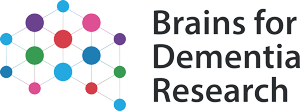Assessment data
At Brains for Dementia Research (BDR), we have data from over 3,000 volunteers. Some of our participants are cognitively impaired whilst others are normal controls. All participants undergo regular, repeated neurocognitive and neuropsychiatric assessments and for some participants this longitudinal data extends over 14 years.
In addition to assessment data, for cases where participants have died and donated brain tissue, we also have associated neuropathology and genetic data.
Do I need ethical approval?
No. Use of the anonymised BDR data in the UK is covered by our own BDR approval, so individual research ethics review is not required. Overseas requests may need approval by your Institutional Review Board.
How do I request data?
By application (including scientific justification, lay summary, hypothesis, background and experimental section) to the data portal, Dementias Platform UK. (DPUK). Details can be found on their website: https://www.dementiasplatform.uk/ Once an application is submitted to DPUK, it is forwarded to the BDR Coordinating Centre and then reviewed by the BDR Unified Access Committee. The Committee is made up of both expert and lay members. Reviews are generally completed quickly (usually in 2 weeks or less) and the team at the Coordinating Centre as well as the staff at DPUK, liaise with researchers to support their applications.
Are there charges involved?
Access to the BDR data is free of charge. Further information about the application process, can be found here
What happens after approval?
After project approval, access to longitudinal assessment data is provided through the DPUK data portal. This provides a secure, remote desktop to access and analyse your data from anywhere in the world with an internet connection. In the DPUK data portal, BDR data can be combined with other cohorts for comparative studies or to produce a larger combined cohort, joined to data derived from neuropathological assessment from the UK Brain Banks Network, or analysed alongside your own data produced from brain tissue, biofluids, or other BDR data sources. The DPUK team can assist in all aspects relating to the management of this data, analysis, and production of outputs.
Assessment data includes:
Participant details
- Demographics
- Medical history
- Family history
- Education level
- DLB Toolkit
- COVID history
Cognitive assessment tests
- MMSE
- MOCA
- CAMDEX
- TICS
- Cornell
- NART
- CDR
- BADLS
- Hachinski
- NPI (A-L)
Physical/Sensory
- Waist / Hip meansurements
- Eyesight
- Hearing
Lifestyle
- Physical activity
- Diet
- Social contacts


